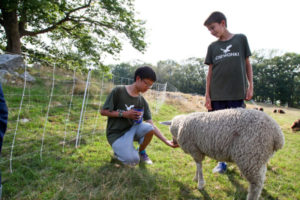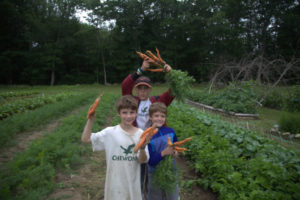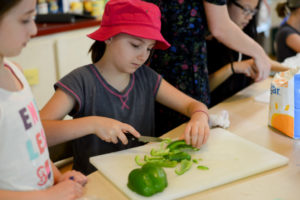Camps and Sustainability: Practicing It, Teaching It

Respect for the Environment at Camps
Sustainability. As one camp director puts it, the term means many things to many people. But one fact is certain. Camps throughout Maine are seeking to implement and teach practices that show respect for the environment. From utilizing solar installations to planting trees to serving locally sourced foods, camps are on board when it comes to promoting sustainable living.
Solar Panels, Composting and Pigs
Kieve-Wavus Education, Inc. operates Camp Kieve and Wavus Camp for Girls, both on Damariscotta Lake. Executive Director Henry Kennedy says Camp Kieve boasts a number of hot water solar installations, while at Wavus, a barn has recently been outfitted with solar panels that will supply about 11 percent of electricity needs of both camps. Kieve uses waterless urinals, and has installed mechanisms in all new buildings called “light tubes,” which magnify and convey natural light to areas like basements and windowless bathrooms.
“We’re leading by example,” Kennedy says, by seeking to minimize the camps’ carbon footprint and at the same time teaching campers.
And while sustainability efforts “must make economic sense,” Kennedy says, the organization wants to teach the nearly 10,000 individuals who visit their properties each year that sustainability is an essential priority.

In Wiscasset, Camp Chewonki is also leading the way in sustainability efforts. Director Garth Altenburg says the actions are a “direct derivation” of the camp’s mission.
“We connect kids to the natural world,” he says. “If we aren’t stewards of the natural world, we’re in trouble.”
That means solar panels on south-facing roofs. It means cabins without electricity or running water. It means waterless, Clivus, toilet systems that break waste down into compostable material. And it means a “closed system” of composting food waste.
“We compost everything from our dining hall,” Altenburg says. It goes to feed the pigs, or to nourish the gardens. The gardens produce food; so do the pigs.
According to Altenburg, the camp’s garden produces about 25 percent of the produce consumed by the camp. “We can’t scale to capacity,” he says, “but we supplement heavily with local farms.” Each day’s menu lists what food was provided by the Chewonki garden and what local producers provided.
“Our farm is an incredible sustainability system,” Altenburg says.

Locally Sourced Food and Clean Water
Composting and recycling are the norm at Camp Kawanhee for Boys in Weld as well, says Executive Director Liz Standen. Compost nourishes the camp garden, which in turn helps provide food not only in the dining hall, but for the campcraft activity cooking projects.
As a result, Standen says, campers “get an understanding of where their food comes from.”
Another initiative at Camp Kawanhee is an annual Earth Day celebration at camp. On that day, campers eat only locally sourced food, Standen says. Last year’s Earth Day also had each lodge at camp plant a tree. Campers took responsibility for caring for them for the remainder of the camp season.
“Our hope is that by living so close with nature, [campers] grow up to have an appreciation for it and get engaged in the care of it,” Standen says.

The camp also collaborates with the Webb Lake Association. Campers measure water pH and participate in conversations about what clean water means to loon health.
“We want to hook kids on nature,” Standen says. “We feel that’s good for our world.”
Standen says camp staff members are often the driving force behind new sustainability initiatives. A counselor interested in agriculture and sustainability led the charge to the establishment of the camp garden, for example.
“What’s driven this, and allowed us to move forward in our camp, is that we attract staff that are interested in this sort of thing,” Standen says. “They are able to turn kids on because it is what matters to them.”
As a result, the focus of the camp’s nature program has shifted, Standen says. While the curriculum used to focus on identification of flora and fauna, it now focuses on “when you do this, this is what happens.” Whether it’s water quality affecting fish and bird life, or food waste’s impact on the planet, kids learn about environmental impact, Standen says.
These are just a handful of camps minimizing their carbon footprint and striving to achieve a mission of creating stewards of the earth; countless Maine camps seek to do the same. Thousands of youngsters each summer swim and paddle in the state’s lakes and ponds, hike its trails, stand under its star-filled skies. They learn a vast range of outdoor living skills and if camp directors have their way, they leave with memories, new abilities, and a renewed sense of responsibility toward their planet.